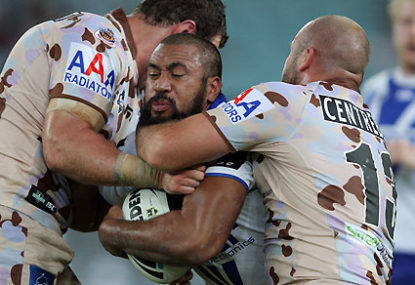LISTEN: Knight breaks Fletch and Hindy with perfect Elvis impression, ridiculously good breakdancing
What a talented man Greg Marzhew is!

Offloads are a misleading and underrated statistic. When I was playing junior footy, my coach would crucify me if I tried to pop an offload and it went astray.
He would tell me I was a prop forward and that my job was to hit it up and never pass the ball. But then one day, something changed…offloads became hip, en-vogue and every man and his dog was trying to be the next John Cartwright.
The offload mania of the early 90’s was infectious and like all crazes, it got out of control. Players pushed the pass in their own territory or passed to players under pressure. Eventually, the ‘offload bubble’ popped and offloads became a rarity.
In the late 1990’s, with the Super League war speeding the game up for television purposes, offloads became an inefficient play. Why try a risky offload when scoot from dummy-half, dive on your knees and get a quick play the ball?
So forwards once again reverted back to their 1980’s style of hitting up and rarely looking for an offload. As a ball-playing forward, I hated this conservatism and I think we had a generation of forwards with poorer ball skills as a result (of course there were some exceptions to this).
But now, in 2012 and in an era of gang tackles, grappling and slow play the balls, coaches are starting to realise that the offload is their secret weapon. Like a treasure map buried, they are dusting off the strategy guidelines and encouraging their forward to look for offloads whenever possible.
Dessie’s Dogs are the most famous exponents of this.
The reason – offloads are the best way to maintain momentum, overcome group tackles, create gaps and tire your opponents by forcing second efforts.
Sure, a poor offload is still a bad play, but a good offload is worth its weight in gold.
The problem with NRL statistics is they are not sophisticated enough. They lump all offloads together and do not make any distinction between the different quality offloads. This has made offloads one of the most hard to gauge statistics going around.
So rather than focus on which players are offloading and how successful their offloads have been (which would be a laborious task) I have taken my analysis to a more macro level and tried to establish a correlation between offloads and winning percentage.
The results were not that interesting to start with. There were eight games where each team made the same amount of offloads, leaving 107 games where one team had more than the other. In 64 of these games, the team with the more offloads won: thats 59.4%.
But when we look at the how this applies for certain teams, we see that offloading is not a strategy that is successful for all teams.
The Newcastle Knights, probably the biggest flop of the season, are an outlier and their results buck the trend.
The Knights have only won 4 games this year, but in all 4 of those wins they actually lost the offload count. Even more surprising, is that in the three games this year where they went on to win the offload count, they have lost their match.
So although there is only a slight positive correlation between offloads and winning games in 2012 for all NRL teams, there is a strong negative correlation between offloads and the Knights winnings games in 2012.
The reason for this surprising trend – Wayne Bennett.
Bennett is a great coach – no doubt. But this is one of his worst years on record. Despite assembling a top notch squad, his team is sitting near the bottom of the table.
Bennett came out a few weeks ago and criticised the game for the amount of wrestling that has crept back into the game. After analysing the effect of offloads so far this year, I am convinced Bennett is struggling to adapt his team’s strategy to the modern game.
Some teams are close to unstoppable when offloading
The Bulldogs, as you would expect, have the best correlation between winning offload battle and winning the game. Of their 9 wins in 2012, they have won the battle for offloads on 7 occasions.
Others need to give offloading a go!
Finally, the team sitting dead last – Parramatta Eels – has the worst offload record in the competition, having only won the battle for offloads 3 times in their 13 matches this season.
The lessons I take away from this is that offloading is generally a good strategy and winning the battle for offloads is an important part of a winning the game. But not all teams benefit from utilising the offload, with the Knights only wins this season coming from games when they lost the battle for offloads.
The Bulldogs are the most effective offloading team in the competition, with 6 of their 7 wins this season coming in games where they won the offload battle. And finally, Stephen Kearney should encourage his players to offload more. He probably is only a few weeks away from losing his job, so what has he got to lose?